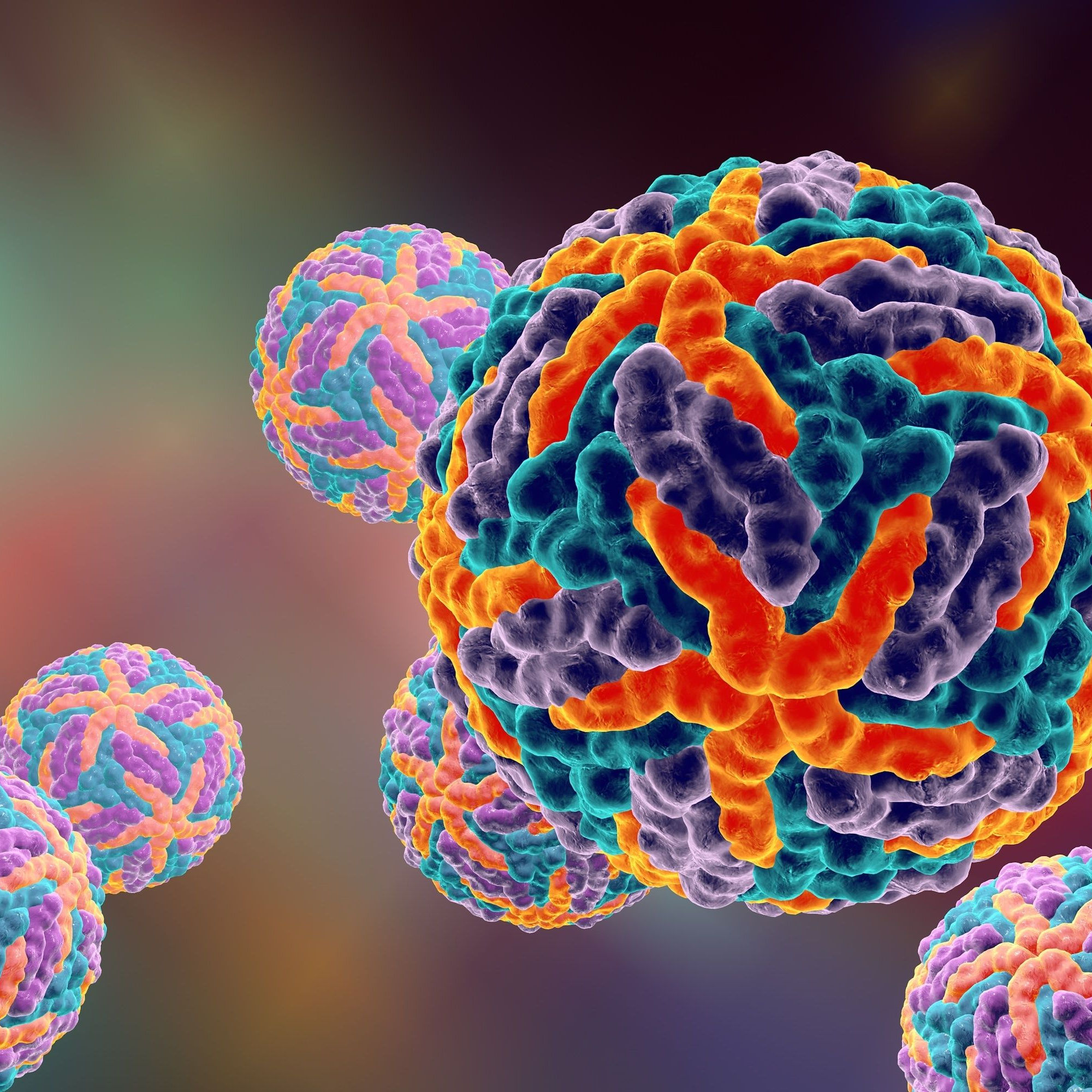
What is the dengue virus?
The dengue virus is a virus that can trigger dengue fever, a haemorrhagic fever, in both humans and primates. The pathogens are transmitted by mosquitoes, mainly of the Aedes family. The dengue virus belongs to the Flaviviridae family. These consist of a single-stranded RNA with positive polarity. The virus is surrounded by a spherical capsid.
Where is the dengue virus mainly found?
The mosquitoes that transmit the virus are mainly found in the subtropical as well as tropical climates, often in densely populated regions. In several Latin American and Asian countries, dengue fever is one of the main causes of deaths in children. The mosquitoes like to lay their eggs near bodies of water, bottles, rain barrels, buckets, etc. If females are infected with the pathogen, they will pass the virus directly to their brood . It is also the females that transmit the dengue virus to humans.
So far, the Aedes mosquito is not yet native to Germany . The German patients who have been infected with the dengue virus did so in subtropical and tropical countries. Many Germans like to travel to these countries, which is why the number of imported infections has also risen sharply in recent years. In 2018, about 600 cases were reported in Germany .
How is the dengue virus transmitted?
The dengue viruses that trigger the dangerous dengue fever are transmitted by Aedes mosquitoes, most frequently by the Asian tiger mosquito, the yellow fever mosquito as well as yellow fever tiger mosquito.
People usually become infected via a bite from the infected mosquito. The mosquitoes can ingest the infected blood of an infected person and thus pass it on to another person. Infection without Aedes mosquitoes, i.e. purely from person to person, does not usually take place . Unlike many other viruses, the dengue viruses, at least according to current knowledge, do not occur in the saliva of a person. So infection through kissing, sneezing or coughing is not possible. However, there are individual cases in which researchers have come to the assumption that people have become infected during unprotected sex .
What are the symptoms of the dengue virus?
An infection with the dengue virus causes the so-called dengue fever. The incubation period is about 14 days. In most cases, however, the disease breaks out between the 4th and 7th day.
The symptoms that occur during a dengue virus infection are very unspecific and similar to those of the flu. The following symptoms occur :
- High fever, up to 40 degrees,
- Chills,
- Headache and aching limbs,
- General fatigue.
Due to
the severe muscle pain, dengue fever is also called
"bone-crushing fever". The course of the fever is usually
biphasic, i.e. two-parts. Fever episodes occur and with the
second episode, an itchy, rubella-like rash develops,
which affects the whole body. Other possible accompanying symptoms
of dengue fever may include the following:
- Nausea,
- Vomiting,
- Swollen lymph nodes.
What complications can occur with dengue virus?
In most of those affected, the dengue virus infection heals without consequences. However, some patients develop complications. These occur particularly often in children and young people under 15 years of age. The following two complications can have life-threatening courses:
Dengue haemorrhagic fever:
In dengue haemorrhagic fever, an acute outbreak of fever leads to a sharp drop in the platelets, or thrombocytes. This leads to various bleedings, such as pinhead-sized haemorrhages in mucous membranes or in the skin, bleeding gums, nosebleeds and gastrointestinal bleedings.
Dengue shock syndrome:
Due to the disease, the blood pressure can derail and the heart consequently no longer transports enough blood through the body. Consequently, the heart rate increases. However, the vital organs such as the kidneys and brain are no longer supplied sufficiently.
The signs of such complications can be the following:
- Sudden abdominal pain,
- Severe and repeated vomiting,
- A sudden drop in body temperature to less than 36 degrees,
- Heavy bleeding,
- Restlessness, drowsiness and confusion,
- Rapid pulse, sudden drop in blood pressure.
Both complications can be life-threatening and need to be treated in hospital.
How is dengue virus diagnosed?
The symptoms of dengue fever are indistinguishable from those of a normal flu in the initial phase. That is why the medical history is an important part. Here, the doctor will ask whether the affected person has been travelling in a risk country in the past few days. After the anamnesis and the physical examination, a blood test is necessary to determine the infection with the dengue virus beyond doubt. Here, the blood sample taken is examined for the specific antibodies against the pathogen.
How is the dengue virus treated?
There is no causal therapy for dengue fever. This means that treatment is purely symptomatic. It is important to drink enough fluids, rest and take it easy. In addition, pain and fever can be treated with paracetamol or ibuprofen. As long as there are no complications, a patient does not necessarily have to be treated at hospital.
The most important and safest measure to prevent infection is to avoid mosquito bites:
- Wear long-sleeved clothing and long trousers,
- Use sufficient insect repellent,
- Use mosquito nets,
Is the dengue virus notifiable?
According to the Infection Protection Act, proof of infection with the dengue virus must be reported. Anyone planning a trip to a dengue fever area should inform themselves in detail about the protective measures and risks before starting the trip. Appropriate advice is offered by tropical institutes and travel medicine specialists.
